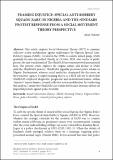Files in this item
Framing injustice : Special Anti-Robbery Squads (SARS) in Nigeria and the #EndSARS’ protest response from a social movement theory perspective
Item metadata
| dc.contributor.author | Omeni, Akali | |
| dc.date.accessioned | 2022-12-14T15:30:03Z | |
| dc.date.available | 2022-12-14T15:30:03Z | |
| dc.date.issued | 2022-12-13 | |
| dc.identifier | 278158442 | |
| dc.identifier | b4d1a349-710f-4da7-b0eb-1d0a5fa9f45b | |
| dc.identifier | 85148642380 | |
| dc.identifier.citation | Omeni , A 2022 , ' Framing injustice : Special Anti-Robbery Squads (SARS) in Nigeria and the #EndSARS’ protest response from a social movement theory perspective ' , Modern Africa , vol. 10 , no. 2 , pp. 9-32 . https://doi.org/10.26806/modafr.v10i2.409 | en |
| dc.identifier.issn | 2336-3274 | |
| dc.identifier.other | ORCID: /0000-0002-2282-6626/work/124889174 | |
| dc.identifier.uri | https://hdl.handle.net/10023/26588 | |
| dc.description.abstract | This paper employs Social Movement Theory (SMT) to examine collective action mobilization against malfeasance by Nigeria’s Special Anti-Robbery Squads (SARS). Created in the 1990s to counter violent armed robberies, SARS gradually derailed and became discredited. Finally, in October 2020, after weeks of public protest, the unit was disbanded. The #EndSARS movement proved instrumental to that outcome. This article explores the origins, nature and decline of SARS until the #EndSARS protests. #EndSARS emerged as a rare instance of a social movement that provoked police reform in Nigeria. Furthermore, whereas social media has dominated the discourse on the protesters’ agency, I employ framing theory as a sub-set of SMT to show that #EndSARS employed diagnostic, prognostic and motivational frames, within “injustice” master frames, towards collective action mobilization. In conducting this analysis, I situate the #EndSARS case within the broader literature debate on impactful protests against police brutality. | |
| dc.format.extent | 24 | |
| dc.format.extent | 184012 | |
| dc.language.iso | eng | |
| dc.relation.ispartof | Modern Africa | en |
| dc.subject | Social movement theory | en |
| dc.subject | Framing | en |
| dc.subject | Nigeria Police Force | en |
| dc.subject | EndSARS | en |
| dc.subject | SARS | en |
| dc.subject | Anti-Robbery | en |
| dc.subject | Protest | en |
| dc.subject | JZ International relations | en |
| dc.subject | T-NDAS | en |
| dc.subject | MCC | en |
| dc.subject.lcc | JZ | en |
| dc.title | Framing injustice : Special Anti-Robbery Squads (SARS) in Nigeria and the #EndSARS’ protest response from a social movement theory perspective | en |
| dc.type | Journal article | en |
| dc.contributor.institution | University of St Andrews. School of International Relations | en |
| dc.identifier.doi | https://doi.org/10.26806/modafr.v10i2.409 | |
| dc.description.status | Peer reviewed | en |
This item appears in the following Collection(s)
Items in the St Andrews Research Repository are protected by copyright, with all rights reserved, unless otherwise indicated.

